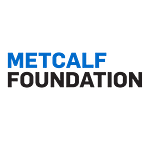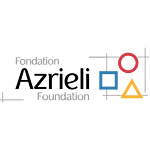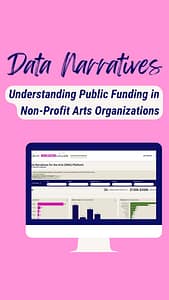The DNA Platform
Public Dashboard
The DNA Platform: Public Dashboard is complimentary for all to access.
- KEY FEATURES
Financial data from 4500 arts and cultural organizations, spanning 2013 to 2022.
Data Narratives exemplifying how you can use the platform.
Enhanced Dashboards
The Organizational Insights Dashboard is the latest addition to Mass Culture’s DNA Platform, a growing series of dashboards designed to provide deeper sector insights. Building on the public-facing Sector Snapshot Dashboard launched last fall, this new tool offers enhanced features, including side-by-side comparisons and expanded ways to explore operational and financial data.
Keep reading to find out how you can access the DNA Platform: Enhanced Dashboards.
- KEY FEATURES
Find My Peers:
- Filter organizations by revenue, staff size, and primary funding sources.
- Use geographic filters (province, municipality, and federal riding) for targeted insights — perfect for advocacy ahead of the upcoming federal election!
Benchmarking Made Easy:
- Create custom peer groups and compare key data points, including fundraising activities, public funding proportions, and revenue/expenses by category.
Charitable and/or nonprofit arts and cultural organizations
Charitable and/or nonprofit arts and cultural organizations have COMPLIMENTARY access to the Enhanced Dashboards if their organization’s data is included in the data set. Professional artists also receive complimentary access.
Set up an account to access the Enhanced Dashboards.
If your information is not included in the DNA Platform, check out how to add your data.
If you do not wish to submit organizational data to the data set, please subscribe by paying the monthly or annual subscription fee to gain access to the DNA Platform. Contact us if you wish to pursue this option: email [email protected].
Professional Artists
Professional artists will receive COMPLIMENTARY access upon verification.
A professional artist is someone who:
- has specialized training in the artistic field (not necessarily in academic institutions);
- is recognized as a professional by their peers (artists working in the same artistic tradition);
- has a history of public presentation, publication and/or production;
- and is committed to devoting more time to artistic activity, if possible financially.
Mass Culture recognizes that some flexibility may be required in interpreting eligibility criteria. We encourage you to discuss your eligibility with us.
Other users
For all other organizations or users, access to the DNA Platform’s Enhanced Dashboards will be offered by monthly fee or annual subscription.
Why is there a fee?
The DNA Initiative demonstrates unique value to the sector and we see these fees not as an expense but as an investment in the arts and cultural community. A fee structure is in place to ensure equitable access while balancing sustainability and value creation as follows:
- Sustainability & Growth: A fee structure ensures that the DNA Platform remains financially viable, allowing for continuous improvements, development and data expansion. Fees will also fund research, engagement and partnerships to enhance the knowledge mobilization in the arts and culture.
- Value to the Arts & Culture Sector: A well maintained, continuously evolving platform and suite of tools and resources adds value to its users by generating new insights, enabling the community to be strategic, focused and adaptive.
- Commitment & Quality: Fees are a commitment to our collective desire and need for a centralized and accessible repository for arts and cultural data and research. This investment will support moderation, quality control, and data integrity, leading to a centralized, more reliable and trusted resource for all.
- Accessibility: From basic free access to paid subscription, we hope to ensure that those with limited resources can still benefit while allowing sustainability through paid users.
- Competitive Positioning: The ability to enhance our knowledge-sharing and community of practice allows for, not only Mass Culture, but for the arts and cultural community to be competitive within our disciplines and beyond our sector.
What is the fee?
For a limited time, Enhanced Dashboards will be complimentary to all charitable and or nonprofit arts and cultural organizations who have their data in the data set.
Funders, Academics and Consultants will be charged a monthly subscription of $300 + HST, or an annual subscription of $3000 + HST.
For-profit organizations and educational institutions will be charged an annual subscription of $3000 + HST.
Licensing of the DNA Platform is available. Please inquire directly to discuss your needs by email at [email protected].
About the DNA Platform
Welcome to Mass Culture’s DNA Platform, a series of dashboards that present data-driven insights critical to the arts sector. The first dashboard, released in November 2024, provides a sector snapshot analysis using financial data from over 4,500 arts organizations spanning 2013 to 2022, offering a comprehensive overview of the economic state of the arts sector over the past decade.
The DNA Platform, shaped by community consultation, is organized like a book, with each dashboard representing a different data narrative. In March 2025, we launched an additional dashboard, with more to follow, each inviting an in-depth exploration of various aspects of the Canadian arts sector by triangulating various data sources and addressing critical sector inquiries.
In collaboration with Purpose Analytics, we have also created Data Narratives. In the accompanying video, we provide some insight into how the Data Narratives work. We hope it whets your appetite for data exploration!
How to add your organization
The DNA Platform contains the financial data of 4000+ arts organizations. To check if your organization is already included, visit the DNA Platform and click the link at the top of the page that says, “Not sure if your organization is reflected in the dataset? Find out.”
If your organization isn’t yet represented and you’d like it to be, you have two options:
- If your organization is in the CADAC database, take two minutes to complete the CADAC Permission Form.
- If your organization is not in CADAC, you can fill out the DNA Simplified Form and email it back to Robin Sokoloski at [email protected].
Resources
DNA Platform Orientation
Asynchronous, in-depth video providing an introduction to and overview of the DNA Platform: Sector Snapshot Dashboard.
More on the DNA initiative
More on the DNA Platform
Frequently Asked Questions
When will not-for-profits be added to this?
CADAC organizations have been added – if an organization has shared their CADAC ID with us and given us permission, we have added them.
In order to make this platform inclusive to any organizations that would like to add their information we’ve created a “simplified form” for those organizations that do not have charitable status and are not in CADAC.
How granular is the 'region' filter?
Right now, the ‘region’ filter is organized by province. However, you will be able to get more granular in the enhanced dashboards, which will be coming in early 2025. For example, if you want to search by municipality, you will be able to do that.
How was ‘discipline’ data captured?
Mass Culture used the organizations’ own descriptions of their work, provided in their T3010 return, to determine their categories.
Do you have consent to disclose individual data points? If, for example, I wanted to integrate a subset of organizations with another dataset, does your consent allow for that?
The CRA data is public.
For the CADAC data, individual consent is requested/obtained for any dataset. CADAC allows aggregate data only.
Which workers does the ‘part-time staff’ section refer to?
This language is taken from line 370 on the T3010 form where the staff count for part-time staff is reported. Only employees are entered in this field. Definitions of “part-time” vary by province/territory. Independent contractors are not counted in this field.
Is CRA data capturing organizations that are not receiving operational funding?
CRA captures data from all registered charities regardless of funding. The dataset is from a mandatory return (T3010 form) that charities must file each year.
Within the public funding bar, does it show more granularly the funding body received from? (ie municipal, provincial, federal)?
You’ll be able to do this in the dashboards that we will be rolling out in 2025
If we are an arts org and a charity, has our data been included?
Yes, your organization is included in the DNA Platform. If you have any questions specific to your organization, reach out to [email protected].
Is there a way to capture volunteer (unpaid) staffing hours?
The T3010 form does not capture this information.
Is the code for data transformation and dashboard open source, especially the filtering of arts orgs on all the T3010 data?
We are using open source tools. The code itself is not open source at this moment.
Through the DNA Platform and accompanying learning tools, DNA will empower the arts sector with a data-driven mindset, showcasing the genuine value and immense impact this sector brings to society. Thank you to our partners and funders for supporting this vital initiative.
If you believe in the power of data- and research-driven work, donate to Mass Culture today!
This initiative is made possible through the support of the following










